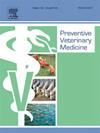Knowledge, attitudes and practices on antimicrobial use and antimicrobial resistance among shrimp aquaculturists in Peninsular Malaysia
IF 2.2
2区 农林科学
Q1 VETERINARY SCIENCES
引用次数: 0
Abstract
In aquaculture, production intensification and the increasing occurrence of diseases are equally driving antimicrobial use (AMU) and the development of antimicrobial resistance (AMR). There is inadequate awareness and knowledge regarding AMU and AMR among the public in Malaysia. Thereby, AMR reduction action plans critically require the involvement of farmers as end users of the antimicrobials. The knowledge, attitudes and practices (KAP) survey can evaluate the farmers’ awareness level about the issue. To date, no KAP survey has been conducted among shrimp aquaculture farmers in Malaysia regarding AMU and AMR. In addition, no suitable questionnaire is available to conduct the study. Therefore, this study has developed a questionnaire to evaluate the KAP of Penaeus vannamei and Penaeus monodon aquaculture farmers towards AMU and AMR in selected states in Peninsular Malaysia. In total, 113 farmers participated in this survey. The majority (88.1 %, n = 89) of 101 respondents who completed answering the knowledge- and attitude-related KAP items had inadequate knowledge of AMU and AMR. Regarding attitude, the percentages of farmers with good attitudes (49.5 %, n = 50) and poor attitudes (50.5 %, n = 51) are comparable. Nevertheless, a high percentage (95.0 %, n = 96) of them have never used antibiotics on farmed shrimp, indicating good practices in terms of AMU. The Pearson correlation revealed a large positive association between knowledge and attitudes. To the best of our knowledge, this study is the first to develop a questionnaire and assess the KAP regarding AMU and AMR among shrimp aquaculture farmers in Malaysia.
马来西亚半岛虾类养殖者对抗菌素使用和抗菌素耐药性的知识、态度和做法。
在水产养殖中,生产集约化和疾病发病率的增加同样推动了抗菌素使用(AMU)和抗菌素耐药性(AMR)的发展。马来西亚公众对AMU和AMR的认识和知识不足。因此,减少抗菌素耐药性行动计划迫切需要农民作为抗菌素最终使用者的参与。知识、态度和实践(KAP)调查可以评估农民对这一问题的认识程度。迄今为止,尚未在马来西亚对虾养殖户中进行关于AMU和AMR的KAP调查。此外,没有合适的问卷来进行研究。因此,本研究编制了一份调查问卷,以评估马来西亚半岛选定州的凡纳滨对虾和白对虾养殖户对AMU和AMR的KAP。共有113名农民参与了本次调查。101名完成知识和态度相关KAP项目的受访者中,大多数(88.1 %,n = 89)对AMU和AMR的认识不足。态度方面,态度好(49.5% %,n = 50)和态度差(50.5 %,n = 51)的农民比例具有可比性。然而,他们中有很高比例(95.0 %,n = 96)从未对养殖虾使用抗生素,表明在AMU方面的良好做法。皮尔逊相关揭示了知识和态度之间的巨大正相关。据我们所知,这项研究是第一个在马来西亚虾类养殖户中开发问卷并评估有关AMU和AMR的KAP的研究。
本文章由计算机程序翻译,如有差异,请以英文原文为准。
求助全文
约1分钟内获得全文
求助全文
来源期刊

Preventive veterinary medicine
农林科学-兽医学
CiteScore
5.60
自引率
7.70%
发文量
184
审稿时长
3 months
期刊介绍:
Preventive Veterinary Medicine is one of the leading international resources for scientific reports on animal health programs and preventive veterinary medicine. The journal follows the guidelines for standardizing and strengthening the reporting of biomedical research which are available from the CONSORT, MOOSE, PRISMA, REFLECT, STARD, and STROBE statements. The journal focuses on:
Epidemiology of health events relevant to domestic and wild animals;
Economic impacts of epidemic and endemic animal and zoonotic diseases;
Latest methods and approaches in veterinary epidemiology;
Disease and infection control or eradication measures;
The "One Health" concept and the relationships between veterinary medicine, human health, animal-production systems, and the environment;
Development of new techniques in surveillance systems and diagnosis;
Evaluation and control of diseases in animal populations.
 求助内容:
求助内容: 应助结果提醒方式:
应助结果提醒方式:


